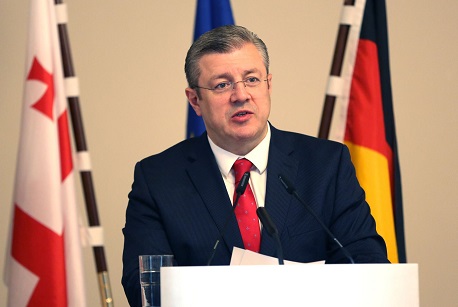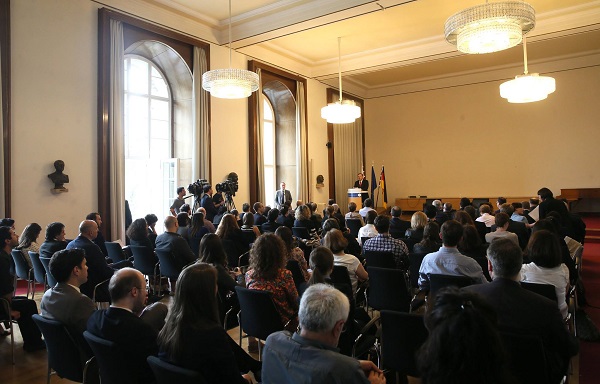PM speaks at Humboldt University, explains why Georgia is part of Europe

Georgia’s Prime Minister has delivered a poignant speech at Humboldt University in Germany where he explained his country’s European intentions and explained why Georgia considered itself a truly European state.
Speaking to students and staff yesterday Prime Minister Giorgi Kvirikashvili said Georgia had traditionally been part of Europe and since the country gained independence from the Soviet Union in 1992, Georgia had carried out a range of reforms to return into its historical roots.
Kvirikashvili outlined Georgia’s European choice was supported by 80 percent of the Georgian population and the country’s Euro-Atlantic path was irreversible.
He noted Georgia "succeeded and continue to succeed” as it implemented all commitments within its Association Agreement (AA), which includes its Deep and Comprehensive Free Trade Area deal, with the European Union (EU).
In turn this promotes a thriving investment climate and boosts economic growth in Georgia,” said Kvirikashvili.
But associating with Europe was "more than politics and business” for Georgia.
Public lecture at the University of Humboldt on the topic "#Georgia's European Way" @HumboldtUnipic.twitter.com/pbX8CSuY6M
— Giorgi Kvirikashvili (@KvirikashviliGi) June 17, 2016
We seek to bring Georgian and European citizens closer together across a range of sectors and at all levels,” Kvirikashvili said. In this sense he stressed the importance of forging closer people-to-people relationships and that would be provided by the opening of borders.
This is why we place so much importance on achieving visa-free travel for Georgian citizens to Schengen countries. For Georgian citizens this is the most important and most tangible outcome of EU-Georgia association.”
He added Georgia had not only completed but in many areas gone beyond the already stringent requirements of the European Commission to ensure there was no risk of irregular migration or increased criminal activity by Georgians in EU states.
We understand that migration is not the flavour of the day in many European capitals but fear regarding migration should not be allowed to undermine the legitimate exchange and cooperation between friends and allies,” said Kvirikashvili.

Speaking to students and staff yesterday Prime Minister Giorgi Kvirikashvili said Georgia had traditionally been part of Europe. Photo by Prime Minister's webpage.
He then told the story of Georgia in the most direct way possible, stressing why Georgia deserved to be part of Europe again. He said:
- We are a small, strategically located country of nearly four million with enormous economic potential;
- We are a democracy;
- We believe in a free, open and transparent business environment;
- We have pretty much eradicated corruption;
- Over the last five years, we have attracted billions in Foreign Direct Investments (FDI) and unemployment has dropped;
- FDI in Georgia amounted to $ 1.75 billion in 2014, the highest yearly indicator since 2008. In 2015 FDI inflow summed up to $ 1.35 billion; and
- We share our values with the EU and we believe that our future is in working together for a safer, more democratic and prosperous European continent.
Georgia’s large-scaled presence in international peacekeeping missions was also noted, and Kvirikashvili emphasised Georgia was a "top of the class of students in its NATO integration program.”
The PM concluded Georgia recognised there was still much to be done before it could fully integrate with Europe however to progress further Georgia needed to be able to count on allies, Germany among them.
Kvirikashvili ended his two-day German trip yesterday, which came shortly after Germany’s last-minute rebuttal of Georgia’s visa-free travel in EU. After top German officials met Kvirikashvili during the past two days, the German side publically said it supported Georgia’s visa-free travel in the Shengen Zone.
Discussions about Georgia’s visa liberalisation have been postponed within the Council of Europe and European Parliament until September.
 Tweet
Tweet  Share
Share